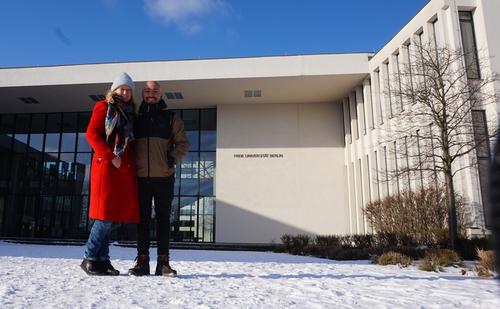Tandem - PhD candidates
Within the framework of the GUMELAB project, Juan Pablo Sánchez Sepúlveda (PhD candidate in Communication Sciences, Pontificia Universidad Católica de Chile) and Holle Meding (PhD candidate in History, FU Berlin) work together in an interdisciplinary tandem and regularly exchange information about their research status, prepare research activities and write articles together.
During Holle Meding's research stay at the University of Chile (summer semester 2021), she and Juan Pablo Sánchez Sepúlveda prepared the workshop "Telenovelas and memory in Latin America" at the University of Chile and gave the lecture "Chile and Germany in transnational comparison: mediating history, politics and entertainment media". In the winter semester 2023/2024, Juan Pablo Sánchez Sepúlveda began his residency as a guest at the Freie Universität Berlin.
Experience of Juan Pablo Sánchez Sepúlveda
During my stay at the Freie Universität Berlin I attended several colloquia, in which topics related to the history of Chile and the importance of television fiction as a means to rethink the official discourse of history were presented. I also advanced in the analysis of my doctoral thesis, which analyzes the representation of violence in Chilean fiction set in the dictatorship and post-dictatorship. In relation to this, I had the opportunity to visit with my tandem partner, Holle Meding, the library facilities of the Ibero-American Institute, where we attended an exhibition commemorating the fiftieth anniversary of the coup d'état in Chile, and where we were able to access resources and documents relevant to our research.
An important part of my internship was working with Holle Meding, with whom I conducted reviews of our dissertations in order to support us from different but complementary disciplinary perspectives. We also worked on an article about the role of historical fiction in the construction and negotiation of collective memory, focusing on Chilean audiences and their interaction in social networks. I had already collaborated with Holle on our paper "Chile and Germany in transnational comparison: Transmission of history, politics and entertainment media," which was presented at the workshop "Telenovelas and images of memory in Latin America" at the Faculty of Communication and Image of the University of Chile in March 2022The opportunity to stay in Berlin was not only enriching on an academic and professional level, but also on a personal level. I was able to engage with the history and culture of the city in situ, walking the streets and visiting places of remembrance in various districts and neighborhoods. This approach allowed me to gain a deeper understanding of historical events and their impact on the present, as well as the role played by various forms of violence since the rise of the Nazi movement. In this context, I visited sites of historical and commemorative interest, such as the Berlin Wall Memorial, which includes both an open-air exhibition and a documentation center that explains, among other things, the construction of the wall and the so-called "death strip," a space between the walls that was guarded by the military; the "Museum of Espionage," which includes an area to learn about the relationship between the U.S. intelligence services and the Chilean military dictatorship; and the "Topography of Terror" museum, where the facilities from which the persecution and assassination of anyone who opposed the U.S. military dictatorship were carried out were once located.
In conclusion, I consider my stay at the Institute for Latin American Studies at Freie Universität Berlin to be a great experience, as it provided me with a valuable insight into German history and politics, as well as significant opportunities for academic and personal growth.

